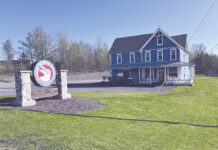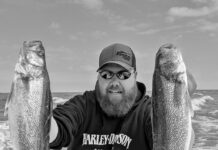ORRVILLE, Ohio — Communicating accurate information about agriculture is one of the biggest challenges farmers face. Misinformation can do a lot of damage in a hurry, and farmers don’t always have the time nor the resources to speak to the masses.
But they do have Gabe Middleton, a veterinarian with the Orrville Veterinary Clinic in Wayne County, Ohio. In October, Middleton will become president-elect of a national organization that strives to publish credible, science-based information in both public and private sectors.
That organization — the Council for Agricultural Science and Technology (CAST) — is made up of scientific groups across the country, as well as individuals like academic professionals, businesses and nonprofits. It publishes task force reports, commentary papers, special publications, and issue papers written by scientists.
Middleton, 35, is at least the third president from Ohio to lead CAST.
He grew up in the small town of Smithville, but started working on a dairy farm when he was 12. He graduated from the College of Wooster, and then Ohio State University’s College of Veterinary Medicine in 2005.
He is married to Megan Middleton and the couple have three children: Kellyn, 5; Edward, 4; and Mason, 1.
Farm and Dairy sat down with him to learn about his new leadership role and how it might benefit farmers.
Q. Tell me about your job at Orrville Veterinary Clinic?
A. I’m a partner in the practice and we have 10 doctors right now. I do exclusively ambulatory large animal practice — mostly dairy cattle, some beef cattle and horses. My role on dairies would be anything from reproduction to drug residue avoidance, milk quality, calf health — I kind of enjoy all aspects of trying to help dairy producers.
In addition to the Orrville clinic, the company now operates two other locations: The Seville-Wadsworth Veterinary Clinic, and The Akron-Barberton Veterinary Clinic.
• • •
Q. What is CAST?
A. I think the easy way to describe it is it’s a society of societies, and so there are multiple universities, corporations, and there’s also a lot of other scientific societies that are a part of CAST and those people all serve as the board of representatives. I was the American Association of Bovine Practitioners liaison to CAST, and started in the animal working group.
• • •
Q. What does CAST do?
A. The major product is scientific papers. We try to gather the experts in the fields. So my role will not be to write the papers, but to take the scientific consensus on a topic, analyze it and put that out in a publication.
And that publication would then serve as something that people could cite in their own literature or their own research, and it’s also typically presented on Capitol Hill, and so it does serve as a way that agriculture is involved with the process of legislation. And we feel like that’s a pretty important thing.
• • •
Q. What are some of CAST’s current or upcoming projects?
A. Issues that affect farm technology. For example, a paper that will be coming soon from CAST deals with antibiotics — the issue: resistance and marketing. There is some fear-based marketing involved with antibiotics.
GMOs are another big issue. There’s some people, I think, would be in favor of that, but it would actually probably have a really negative impact on the environment, consumers and producers. And so CAST tries to look at those things from a scientific perspective. The goal is to communicate credible, sound science.
When choosing topics, we write a proposal, we get it approved and then we try to get authors for the paper and get it published.
The other thing about CAST is that you can go to their website no matter who you are: a farmer, a Ph.D., a journalist, and you can submit an idea and that idea will come to the board of directors and we’ll take a look at it.
• • •
Q. How does having you as a veterinarian and also president of CAST benefit farmers?
A. A few years ago, I had a few clients who were frustrated over affidavits they had to sign saying would not use rbST. They looked at me and said ‘How are you standing up for me.’ I looked at myself and I said that maybe I’m not as much as I should, and that got me interested in doing something a little bit more.
While I don’t necessarily tell my clients exactly everything I do in CAST, hopefully they know that I am standing up for the things they believe in, and I believe you should be able to farm however you want, without having something stigmatizing your methods.
• • •
Q. Is there a good demand for large animal veterinarians?
A. It seems that way, especially in this area where we have a lot of livestock. At Orrville Veterinary Clinic, it seems like we almost can’t keep up with the work some days, but we’re really committed to trying to help our producers be better. The interesting thing about this type of practice is that you learn a lot from your clients, too, whether that’s life lessons or related to agriculture.
I feel passionate about young veterinarians and their career paths and I think that if we don’t have food animal veterinarians, it compromises the safety of our food supply. And by giving these young veterinarians the right start and giving them mentorship, making sure that they have the right information, I think we can shape their career path so that they’ll be successful members of the profession and just improve the lives of people everywhere by improving food security.
• • •
Q. What do you enjoy about being a veterinarian?
A. My dad used to tell me, and he would tell other people, it would be nice to be a veterinarian because you don’t have to deal with people. I still hear people say that. That is 100 percent wrong. That is the No. 1 thing that veterinarians do. This business is the animal business, but it’s really the people business.
I love my clients and I respect them and I admire what they do, because I don’t know that I could do it. I think the relationships that I’ve formed throughout the years are what I enjoy the most.
I also enjoy making positive changes on an operation that impact the health of the entire herd and also impacts the profitability, so that farmers have more to put in their pocket at the end of the day.
• • •
Q. Where do you see the veterinary industry headed?
A. I think we’re probably going to see more and more specialization needed, more and more knowledge needed — at least from an agricultural perspective. We don’t treat as many individual animals as we used to, and instead focus on whole herd health and decisions.
We have to have a higher level of knowledge; we have to be good at analyzing records; we have to be experts in many different fields to survive. When it comes to food security, veterinarians are at the forefront and that is always important.












You Rock Gabe!